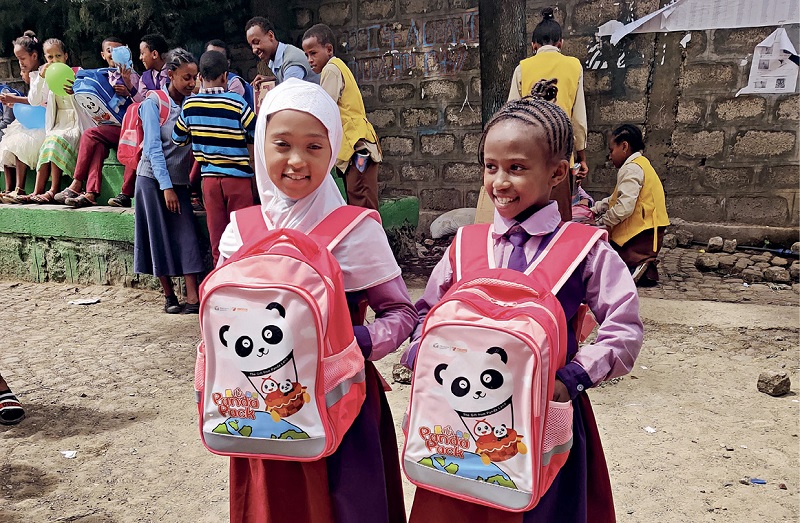
It’s been more than one year since Chinese President Xi Jinping proposed the Global Development Initiative (GDI) at the 76th session of the UN General Assembly. The GDI’s main goals coincide with the UN 2030 Agenda for Sustainable Development. In September, UN Secretary-General Antonio Guterres acknowledged it as “a valued contribution to addressing common challenges and accelerating the transition to a more sustainable and inclusive future.” At the ministerial meeting of the Group of Friends of the GDI in New York in September, Guterres said President Xi proposed the initiative to “help revive global efforts to achieve the Sustainable Development Goals (SDGs).”
The Group of Friends of the GDI has grown to over 60 member states since its inception last year and Guterres said, “The world needs your collaboration and support.” GDI’s importance has been commended by the United Nations and a vast number of countries a few days before the national congress of the Communist Party of China (CPC) in mid-October.
It is significant that Guterres’s words came at a complex global juncture. This year, a report by the UN Development Program indicates a decline in the global Human Development Index (HDI) for two years running, an unprecedented phenomenon in three decades. The HDI is the measure of a country’s progress in three basic aspects of human development: health, education, and standard of living, and the decline, due to the pandemic, climate change and other crises, has resulted in the world’s poor population increasing by more than 100 million. By October the disruption had grown even more dramatic as the Ukraine crisis posed a threat to food security and energy prices, particularly in the southern hemisphere.
The UN diagnosis coincides with the Beijing assessment in the sense that the planet faces a storm of cascading crises, from the COVID-19 pandemic to continuing supply chain disruptions, rises in the cost of living, regional conflicts, and the climate emergency, which have led to growing numbers of the poor and hungry, disruptions of schooling for hundreds of millions of students, worsening inequalities, and rising social unrest.
Let’s remember that the 17 Sustainable Development Goals (SDGs), adopted by the United Nations in 2015, are designed to end poverty, hunger, and discrimination against women. They are also intended to protect the planet. Like China’s GDI, the SDGs have a holistic approach by recognizing that action in one area will affect the outcomes in others, and that development must balance social, economic, and environmental sustainability.

An employee of a guitar business in the County of Zheng’an in Guizhou Province is organizing a batch of newly-sprayed guitars on November 4, 2020.
Is China prepared to push the GDI forward? The answer is a resounding yes. China has amassed impressive clout in several fields to drive more development cooperation. For example, the 2022 Global Innovation Index released by the World Intellectual Property Organization shows China in the 11th place among 132 economies, up one place from its 2021 ranking. The trajectory shows elevation in rank for 10 consecutive years, bringing it to the top of the 36 upper middle-income economies. Sci-tech innovation is a powerful driving force for the development of human societies and China attaches great importance to innovation.
Premier Li Keqiang has said that China will improve international exchanges and cooperation with a more open attitude, deepen its participation in global science and technology governance, and explore new areas for global cooperation regarding sci-tech innovation.
Four decades of growth have increased the wellbeing of Chinese citizens, and China has become one of the pillars of globalization. “China will stand for 30 percent of global growth in GDP during the next 10 years,” Joerg Wuttke, President of the European Union Chamber of Commerce in China, said in a recent interview with Xinhua.
China’s economy has developed from being on the periphery of global trade to becoming the trade powerhouse of the world. The United Nations Conference on Trade and Development presented a clear picture in its report last year. China’s share of global exports of goods between 1978 and 2020 shows an unparalleled trajectory. In 1978 it was 0.8 percent, occupying the 20th place in the table. In 2020, the figure rose to 14.7 percent. And this strong path remains unchanged.
Meanwhile, it seems clear that the other major power, the U.S., is too obsessive with geopolitical games to pay enough attention to the global crises threatening the entire humanity. Nancy Pelosi and other U.S. officials’ controversial trips to Taiwan plus additional political and military moves are taking the U.S. on a dangerous path, especially against the backdrop of the Ukraine crisis. Let’s have in mind, once again: only win-win cooperation and the concept of a community with a shared future, championed by China, can promise the world hope in grim international circumstances. Harrowed by the growing global challenges, what the world needs now is cooperation rather than confrontation. GDI is directing the global attention to what it should focus on. Fortunately, more and more countries are getting on board. 
AUGUSTO SOTO is director of the Dialogue with China Project.